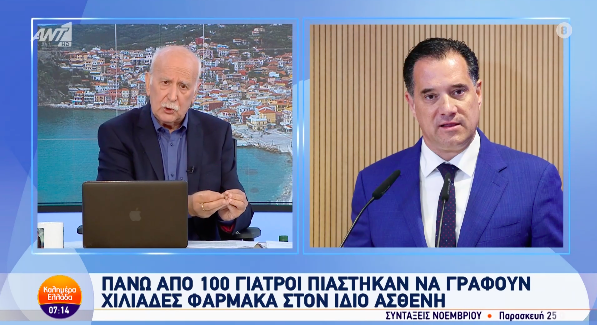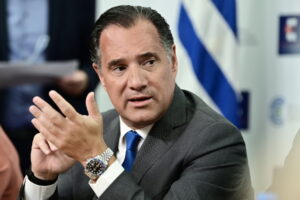The estimated earnings of the doctor who received an €800,000 fine for prescribing thousands of medications using his mother’s AMKA (Social Security Number) were revealed by Health Minister Adonis Georgiadis.
He explained, “EOPYY (National Organization for Healthcare Services Provision) assesses fines at double the amount of illegal profits made. Thus, for the fine to be €800,000, the illegal profit from medications was €400,000, and this is just for 2024. Checks will also be conducted for previous years.”
During a press conference on Wednesday, Georgiadis sent a clear message to doctors involved in excessive prescribing: “Don’t do it. With the systems in EOPYY and HDIKA, we will catch each one of you. Electronic trails don’t disappear. No one will escape. I urge those doctors who engage in this to stop.”
He also urged citizens, “If you see that this has happened with your AMKA, report it to EOPYY, because with the electronic patient file, you may not be allowed to prescribe medications in the future if unnecessary medications have been prescribed to you.”
How 100 Doctors Were Caught
The anti-fraud systems implemented by HDIKA, in conjunction with EOPYY checks, have significantly advanced this year in identifying excessive prescribing practices. The new filters being developed by the Ministry of Health and relevant services aim to ensure that no doctor can break the law and no patient falls victim to fraud, thereby preventing pharmaceutical expenses from escalating due to illegal behaviors.
The use of anti-fraud information systems developed by HDIKA has detected 100 suspicious cases of excessive prescribing against EOPYY. Notably, in the first eight months of the year, these doctors prescribed between 250 and 422 different medications per patient, with total quantities ranging from 250 to 1,630 items.
Specific examples were presented by Minister Georgiadis during a press conference on this topic. Some cases even went viral, such as a physician from Mytilene who prescribed statins to her 15-year-old daughter and responded to the Health Minister’s call by saying, “She has a very rare condition,” promising it wouldn’t happen again.
New Monitoring and Preventative Measures
Currently, doctors receive alerts through electronic prescribing when they exceed the average prescription rates set for conditions and medications. While the state cannot stop doctors from prescribing medications outright, it can call them in for explanations when unusual behaviors are detected. The integration of diagnostic and therapeutic protocols aims to prevent doctors from prescribing medications unless patients are diagnosed with the relevant condition.
Electronic Health Records and AI
A significant change anticipated to help limit unusual prescribing practices is the activation of the Electronic Personal Health File. Once the diagnostic tests each patient undergoes are integrated into their health records, the system can cross-reference all data to confirm diagnoses. The Electronic Health File is expected to be ready within a year, funded by resources from the Recovery Fund.
Additionally, EOPYY’s checks are evolving with the incorporation of artificial intelligence, as noted by EOPYY’s administrator, Theano Karapodini. This will enhance the systems’ capabilities to identify corruption cases more swiftly.
Simultaneously, Minister Georgiadis announced a new citizen consent system for electronic prescriptions, utilizing One Time Passwords (OTP) similar to bank transactions. While this measure wasn’t mentioned in the recent press conference, it is expected to be implemented. It’s important to note that many citizens may unknowingly have medications prescribed to their AMKA without being aware, as they do not have an electronic prescription system notifying them via SMS about each action.
Comprehensive Checks and Combating Polypharmacy
EOPYY and HDIKA services will expand their operations, simultaneously overseeing prescriptions and combating potential polypharmacy. Specifically, there will be checks for individuals aged 60 and older. If they are prescribed more than five different medications, their primary doctor will receive an SMS alert to check for interactions and potential contraindications. Additionally, the prescribing patterns of elderly individuals will be scrutinized, as many follow an automated process of acquiring their medications.
In line with this, the Minister has requested the integration of all medication leaflets into the electronic prescribing system to prevent prescribing medications that may interact negatively with one another. This is a public health protection measure and is also cost-effective, as filtering out unnecessary medications will help control spending.

Among upcoming initiatives is the enhancement of checks at pharmacies and pharmaceutical warehouses. The Electronic System for Monitoring Drug Movement (E.S.P.A.D.I.F), which tracks drugs in shortage across all links in the supply chain, will expand to include a significantly larger number of medications beyond the current 500 monitored.
“We know what enters from pharmaceutical warehouses, what pharmacies sell by tax ID number, and what exits since we have the electronic prescription system. We take this information, and then it is the responsibility of the relevant organization or agency to verify if the data is accurate. So, both information and oversight mechanisms are in place,” noted Aris Angelis, Secretary General for Strategic Planning at the Ministry of Health.
Ask me anything
Explore related questions





